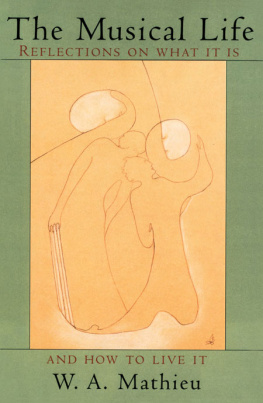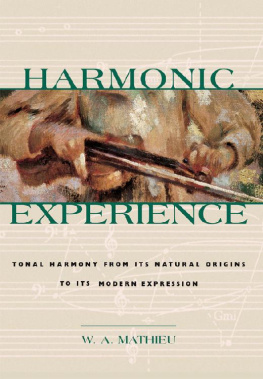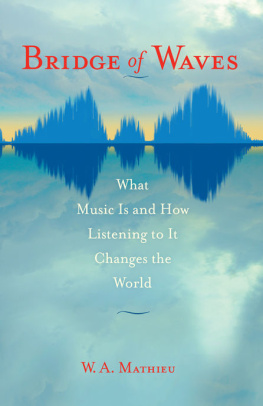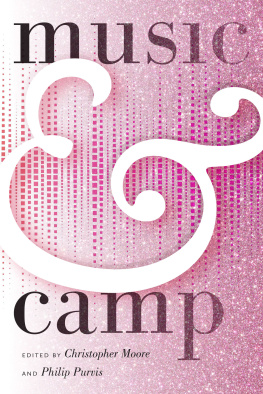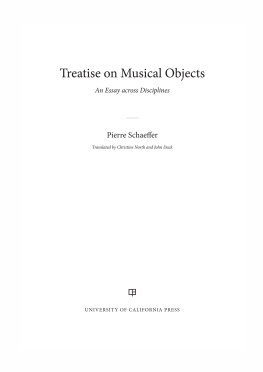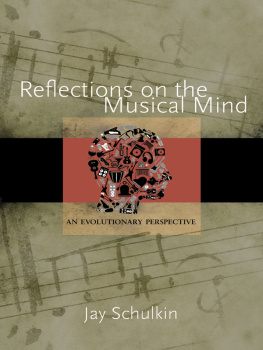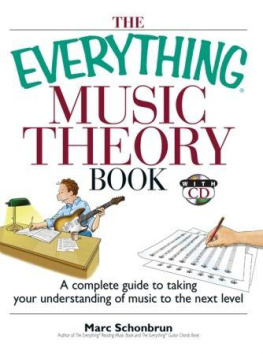ABOUT THE BOOK
Everyone, according to W. A. Mathieu, is musical by natureit goes right along with being human. And if you dont believe it, this book will convince you. In a series of interrelated short essays, Mathieu takes the reader on a journey through ordinary experiences to open our ears to the rich variety of music that surrounds us but that we are trained to ignore, such as the variety of pitches produced by different objects, like glassware, furniture, drumsanything you can tap; or sounds that hover on the border of music, like laughter, the clinking of glasses in a toast, or the unintentional falsetto produced by yawning. Along the way the author teaches aspects of music theory that nonmusicians might ordinarily shy away from. He reveals the way of music to be a profoundly spiritual pathone that is everyones birthright.
WILLIAM ALLAUDIN MATHIEU is a composer pianist whose long and varied career ranges from his early work with the Stan Kenton band and The Second City Theater, to his extensive catalogue of song cycles, works for choir, and instrumental concert music. He has recorded extensively, and is the author of The Listening Book, The Musical Life, and Harmonic Experience: Tonal Harmony from Its Natural Origin to Its Modern Expression.
Sign up to receive news and special offers from Shambhala Publications.

Or visit us online to sign up at shambhala.com/eshambhala.
The Musical Life

REFLECTIONS ON WHAT IT IS AND HOW TO LIVE IT

W. A. Mathieu

SHAMBHALA
Boston & London
2014
Shambhala Publications, Inc.
Horticultural Hall
300 Massachusetts Avenue
Boston, Massachusetts 02115
www.shambhala.com
1994 by W. A. Mathieu
All rights reserved. No part of this book may be reproduced in any form or by any means, electronic or mechanical, including photocopying, recording, or by any information storage and retrieval system, without permission in writing from the publisher.
Library of Congress Cataloging-in-Publication Data
Mathieu, W. A.
The musical life: reflections on what it is and how to live it/
W. A. Mathieu.1st ed.
p. cm.
eISBN 978-0-8348-2929-9
ISBN 0-87773-670-7
1. MusicPhilosophy and aesthetics. I. Title.
ML3845.M382 1994 9339776
781dc20 CIP
MN
BVG 01
To my parents Aron and Rosella
Contents


P EOPLE OFTEN ASK ME, with a kind of misty longing, Whats it like to be a musicianto hear and think musically? Theres a certain romance to this question, but underneath it lies the statement I dont have a musical nature; that is for others. Yet the truth is that musicality is as given as fingers and toes.
There are twin questions spinning through these essays: What is musical? How can we use it? Being musical does not necessarily mean being a musician; it doesnt mean playing the piano at parties or composing songs for lovers. It is a way of being awake, an angle of perception, a tilt of the ear. The musical ear knows it is innately in tune with the universe. A person can talk or move musically, or simply be harmonious without being a fine violinist. You do not need a musicians craft to know that both you and music are made from the same design.
How can I wake up to what I have? becomes the question, not How much do I have? You have what you need. The folks who convinced you that you dont have it are themselves asleep to what is given in human form. Deep down everyone knows that inside there is a vibrant musicality. Sometimes you can feel it welling up and bursting out on its own. But how can you purposefully draw this forward into the steps and breaths of daily life?
The everyday part of us is more likely to have a flyswatter in its hand than a violin. We are more likely to be walking from the kitchen to the dining room not spilling soup than realizing the fine ballet we are performing. I want to point out the musical sense that is already in that life, just waiting for you to notice it, right there where it has been all along.
This recognition comes through willful listeningunobstructed and unencumbered, with no arm in the way and no wadded cotton either. We have the ability to discover what stops our ears and muffles our hearing; indeed, the obstructions themselves often turn into our best friends, like repressed memories that surface and turn into forgiveness.

Everybody has an idea about life. The mason says life is like laying bricks. The chef says it is a seven-course meal. Microbiologists say if we understand microbes we will understand ourselves. This book comes more from a feeling than an idea. It is the feeling I have in my own daily life as a composer and as a teacher, the buoyant complicity that comes from knowing sound.
This feeling cant be said, of course, or written. But consider the faceted, compound eye of a moth: it sees the world through a thousand lenses. Each lens senses an incomplete blur, yet the moths brain assembles the blurred messages into a single image it can use. Let this book be a compound ear, each paragraph a lens for sound, which your ears assemble into a new harmony.

S TEAM IS BILLOWING UP in the shower. I am lathered all over, circling in my thoughts and lost in the sound of white water. Suddenly my wifes scream pries open my mind. I fling aside the shower curtain and prepare to leap down from the trees but, balanced on one leg and dripping, I realize that Devi is actually practicing vocal exercises. The tones of the scale are rising and falling in precisely sculptured terraces; shes singing in full voice and sounding just terrific. Three seconds ago I was rescuing my love from a dire fate; now I am passively delighting in her musicality. A leaping torso has been summarily transformed into an appreciative ear. As I rinse myself off I realize how my instinctual response to dangermy wildnesshas been civilized by tone and tune. One extreme has been replaced by another. I turn off the water and clean up the mess.
My mind frequently returns to this region between scream and scale, an attractive zone where opposites cross over. I want to know all about the mysterious boundary that demarcates wildness from civilization, raw experience from the refinement of art. I want to know the territory between the rescuer and the connoisseur so well that I can draw advantage from either, play one against the other, and live in the best of both of their worlds.
In my boyhood, each time I played Mozart for my Grandma Clara, she said, in a flat voice, Sounds just like water. One day, on a picnic, she announced factually that the creek sounded just like Mozart.
Ten years ago, while visiting New York City, I witnessed a SoHo performance art piece that concluded with a twenty-minute movie of three brown cows grazing peacefully behind a wooden gate, much like the brown cows that graze behind the wooden gate across the road from my house in California. For this I paid fourteen dollars? I asked myself, and went back to California. Only when I saw the real cows across the real road did I consider how the movie cows might have been appreciated in Manhattan.
Next page
